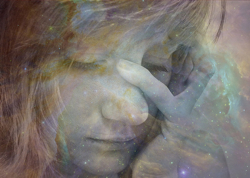What are you referring to when you say, I’m depressed? Where do you draw the line between symptoms of depression and everything else that you consider to be just who you are? I ask because this word, “depression” seems to be losing its boundaries, if it ever had any. This isn’t an academic question. I had to get clear about the extent of the illness before I began to make the right choices about treatment.
Your Diagnosis Depends on You
Psychiatrists have a diagnostic check list and a big book of guidance that lets them draw bright lines between different disorders. It seems authoritative and clear, especially when a doctor finds the right classification for your symptoms and delivers the diagnosis face to face. But there is a problem.
That diagnosis depends on what you report to the psychiatrist. It’s not like diabetes or breast cancer or lupus. A diagnosis for most diseases may start with symptoms that you, the patient, can spot, but those are just hints because several diseases may share those symptoms. Doctors then do blood analysis, x-rays, biopsies or other tests. They need to find specific physical and biological markers to complete the diagnosis.
You won’t get any tests like those for depression. So far, there are none in general use for the mood disorder itself (though there is one test to rule out thyroid disease). Without an objective standard, your diagnosis depends on how you describe what you’re going through and how the diagnosing doctor interprets what you say.
What Do You Tell the Doctor?
Some people have read all about depression, studied their symptoms closely and can present a long, well-defined list. Others know that they hurt but have no clue about depression and diagnosis. They can only pour out their feelings while groping for words. A great many ignore feelings altogether and focus instead on a persistent back pain or intestinal problem that hasn’t responded to any treatment.
I was surprised to learn that most people with depression who go first to their primary care physician complain about a physical symptom rather than any emotional issue. That means a lot of missed or misdiagnoses simply because many people don’t believe emotional problems can possibly be related to “real” illness.
Since the illness embraces so many problems, it’s easy to miss the connection between depression and all the difficulties you’re living with. Maybe you’re not paying much attention to a particular problem – like getting irritated and angry so often or having a hard time concentrating at work. You might assume it’s just part of your nature or a phase that everyone goes through. Or maybe you’re embarrassed to mention it. Or you don’t want to bother a doctor with that problem because you think it’s “just in your head” or that you’re exaggerating and don’t want to sound like a hypochondriac.
Learning to Connect the Dots
For many years, I left out a lot when describing my own depression. I thought of it as a terrible problem but one with only a short list of symptoms. It was mostly about mood: feeling down and out for long periods of time, over and over again. At its worst, I’d feel so hopeless that there didn’t seem to be any point to living. When I wasn’t that low, I’d often drag myself around without much feeling or desire to do anything. Emotionally, I was miles away from my family, completely withdrawn.
That’s what I put under the heading of depression. Anything else was simply me, and there was a lot of trouble under that heading too – anger, anxiety, insomnia, difficulty focusing my mind at work, and a sense of self-esteem that barely qualified me as human. Today, most people would recognize those problems as part of depression. But I didn’t look for that information or try to connect the dots until just a few years ago.
It was a revelation to learn how incomplete my idea of depression had been. Now that I’m looking for everything I can find about the illness, almost every day I find a new study or book that builds more and more links between depression and most of the basic systems that keep the human body going.
One Illness or Many?
-
Self-esteem – All the negative beliefs I have about myself and my value as a person
-
Emotion – Grief and sadness, difficulty experiencing and expressing intense feelings, anger, anxiety, lack of feeling
-
Thinking – Distorted patterns of thinking that reinforce poor self-esteem, expectation of failure, negative attitudes
-
Mental Functioning – Loss of focus and concentration, distraction, slowed thinking, trouble making decisions
-
Behavior – Self-defeating actions, perfectionism, passivity, procrastination
-
Relationships – Emotional unavailability, trouble communicating, isolating myself
-
Physical – Insomnia, fatigue, appetite and weight gain, impact of constant stress, slowed movement
The boundaries of depression seem to be stretching all the time. The symptoms are so diverse that I’ve found it helpful to organize them in groups. Here’s how I do it:
Strategies for Treatment
That’s quite a catalog, and it’s a little hard to see how all this adds up to a single illness. Separating everything in this way does two things for me: I feel less overwhelmed when I can see several distinct problems, and it’s easier to make sense of treatment. There’s no single remedy that covers this broad spectrum, and I’ve been able to decide more easily which therapy fits which cluster of symptoms.
I’m not dealing with one depression but with many depressions. Naming and grouping symptoms may not make any difference to what you feel and live with, but it could make a big difference in the therapies you choose to get rid of depression. The payoff for me has been a more direct path to recovery.
Did it take you very long to learn the full extent of your depression? Once you recognized all the ways depression affected you, how did that understanding affect your treatment?




Another problem with “discussing” one’s symptoms is that another mental illness may be acting in concert with depression. In my case, that would be schizophrenia. I cannot separate the two. Sometimes I feel like Medusa with a head full of snakes writhing in all directions, each with it’s own venom. Not only that, but sometimes when I reach up to take hold of them and assure myself of their physicality, I risk being bitten. Better to leave them alone. Wear a hat. They are attached to my brain, after all, so I can’t just kill them off.
For me, schizophrenia and depression DO seem to respond best to being left alone. If I attempt to undergo yet another round of psychotherapy, they become suddenly deadly and I am confronted with suicidal ideas and despair and relapse. I can sedate myself into being a “good girl” with antipsychotics, but then what kind of life is that? When I just ignore them and go about my daily life, limited as it may seem to others, the nest of vipers that is my mind goes into its winter sleep. And for a while, I am safe.
It would be hard to say what is “just me” vs what is “depression.” I tend to be introverted, but I think depression has deepened my desire to isolate and withdraw and seek that “inner space” whether it be a dark space or a light one. At times I felt the “real me” IS depression. That I have BECOME depression itself rather than just being affected by depression. There is prodrome, full-blown, diagnosis, treatment, prognosis and hopefully recovery. But there are a lot of gray areas in there, too. During the best of times (the spring of hope vs. the winter of our despair) I see myself as a separate entity from depression and free from it’s grasp. During the gray periods I see myself as a convert to despair. And the black times? I won’t even go there. I have already BEEN there and I don’t want to go back.